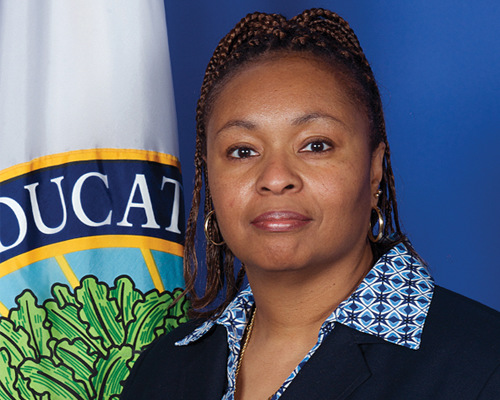Sylvia Lyles, Ph.D., has more than thirty-three years of experience in federal service, having begun her career in 1980 with the U.S. Department of Commerce. From 1984 through 2005, Dr. Lyles served as Education Services Specialist, Program Director, and Acting Director of Education for the U.S. Army's Continuing Education System, Installation Management Agency. In January 2005, she joined the U.S. Department of Education (ED), Office of Vocational and Adult Education, where she served as the Branch Chief for the Programs Administration Branch (discretionary and formula programs), and later became the Deputy Director of the Division of Academic and Technical Education. In June 2007, she joined the Academic Improvement and Teacher Quality Programs staff in the Office of Elementary and Secondary Education (OESE), where she was the Group Director for Academic Improvement Programs before taking on her current assignment as Director, Academic Improvement and Teacher Quality (AITQ).
As Director, AITQ, Lyles provides leadership for more than twenty discretionary and formula programs, overseeing a $5 billion educational investment. She advises the Secretary, OESE Assistant Secretary, and other leadership on education matters, issues, and initiatives that impact students at the pre-K through high school levels. She briefs the Secretary's policy committee and senior staff on national educational issues and concerns where she recommends corrective actions or strategies for program development and improvement. Lyles' responsibilities include, but are not limited to, solving office operational problems, ensuring compliance with organizational policies, reaching compromises, and mediating conflicts between opposing values and perspectives from a national perspective.
Lyles holds a B.A. in education/secondary education from Old Dominion University, an M.A. in education/counseling from Boston University, and a Ph.D. in education/training and organizational performance from Capella University.
What are the accomplishments you are most proud of?
Working at the U.S. Department of Education moves you out of direct contact with administrators, teachers, principals, students, and families. However, I am really proud to be a part of a team that is comprised of brilliant and caring people who want to make a difference. Every time I walk through the door, I may not have direct contact with students—and we may not get it right the first time, all the time—but I feel good that on any given Monday, a student and his or her family will benefit in some small way from the work that I am involved in at the Department.
Where do you see the field in ten years?
I believe that in the next three years and beyond, we will see afterschool continue where it should be—as part of the sphere that moves education. With the implementation of NCLB Act of 2001, we saw the federal afterschool program move from a social and emotional focus to include an academic achievement focus. Because the current administration believes in educating the whole student, family, and community, the afterschool focus is making a full pivot towards cognitive and non-cognitive abilities; this is a good thing for our field, as this places us in the middle of where education occurs.
What are the biggest opportunities for the afterschool industry?
We have to take advantage of our expertise to build alliances across communities and industries. We know that it takes the entire community to support students and teachers. For years, afterschool programs have had to build these alliances in order to implement successful programs. There are many education programs that can learn from us.
To learn and train on the design and implementation of innovative and creative programs, go to an afterschool program. It has been our job to continue student learning in the afterschool space by taking the content learned during the school day and molding it into activities that are innovative and will keep students engaged. We do this well.
What are the biggest challenges facing afterschool?
As we face funding challenges at the federal, state, local, and community levels, we have to find ways to leverage existing funds through partnerships and community involvement to build high-quality programs.
What makes an afterschool program successful?
There are many indicators of success for afterschool programs. For me, an afterschool program is successful when we can create opportunities and activities that will help to keep a child in school and help students to graduate—and graduate on time. Research suggests that students that are in afterschool programs at least three days a week, for two hours each session, tend to have higher student achievement results—this is great. However, I also feel that Drew, who was a student with little confidence, shy and unsure of himself when he started the afterschool program at a very early age and continued in the program in elementary through high school, is now an outgoing, confident, freshman in college. This defines success for me.
Edited by Amy L Charles, editorial director of AfterSchool Today magazine, the Official Publication of the National AfterSchool Association.

